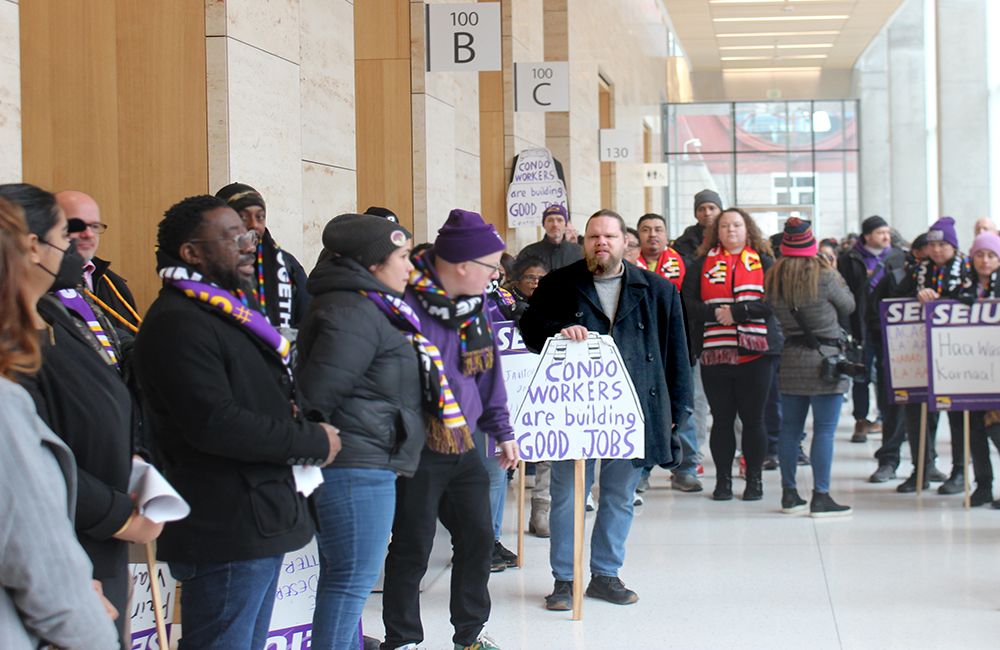
On March 4, 2024, workers rallied before a public listening session on establishing a Labor Standards Board in Minneapolis, where Michael Rubke, center, handed City Council members a petition with signatures from over 150 caretakers in support of a board. Photo by Amie Stager.

Share
“I have been working downtown for several years, and for the first time I feel a new kind of hope for what is to come and the changes that we will win together,” said Estella Tirado in Spanish through an interpreter at a press conference in downtown Minneapolis on November 14. Tirado is a member of Centro de Trabajadores Unidos en la Lucha, a workers’ center based in the Twin Cities, and has worked at a salad restaurant for the past six years. “I hope that more workers communicate and learn about the fight for our futures.”
In June 2022, a majority of the Minneapolis City Council along with Mayor Jacob Frey rallied with essential workers on the steps of the city government building downtown in support of a Labor Standards Board. The proposed board would consist of 15 members: five worker representatives, five community representatives, and five business representatives, all appointed by the City Council and the mayor. It would not have the authority to enact law, but to create temporary boards specific to industries in order to research and recommend policy to the City Council. More than two years after leaders and workers rallied together, the City Council voted 9 to 3 on November 14 to pass the ordinance establishing a board.
Mayor Frey has yet to approve or veto the measure. A spokesperson for the mayor sent the following statement to Workday Magazine Thursday after the vote:
“Mayor Frey has been clear and consistent in his support for a Labor Standards Board that is balanced and fair, but the Council’s proposal was never that. He will be meeting with stakeholders from both the business and labor communities over the coming days to determine next steps.”
According to lead author of the ordinance and City Council Vice President Aisha Chughtai, the authors added a consensus-building provision so that any recommendations must have at least one vote from a worker representative, one from an employer representative, and one from a community representative. “This policy is a product of compromise,” she said at a press conference following the vote. “The idea that this policy has not had input, that this is a one-sided policy, those things are false.”
Michael Rubke is an overnight building attendant for FirstService Residential and an SEIU Local 26 member who said he expects Mayor Frey to approve the resolution. “One of the most frustrating issues in my industry is how hard it is for so many of us to even just take time off work,” he said. “Many of us at FirstService have tried to get the company to sit down and discuss these issues with us. We aren’t getting the transparency we need from this multinational company. Workers like me now have a path forward.”
If the mayor approves the resolution, the city will sunset the Workplace Advisory Commission, and the Labor Standards Board will start May 2025.
The policy has received pushback from business owners large and small. “There are many things that they shared that they need that are so valid,” said City Council member Katie Cashman. “Business interests are not in conflict with labor standards.”
The city of Minneapolis has been partnering with small businesses and academics through the Minneapolis Small Business Project, which has the goal of strengthening the local economy through researching strategic interventions in support of small business and labor standards, with a particular focus on addressing systemic racial equity issues that lead to non-compliance. The project is a partnership between the Minneapolis Labor Standards Enforcement Division (LSED), the small business advocacy organization Main Street Alliance, and the Workplace Justice Lab at Rutgers University. The LSED, created in 2016 to enforce the Earned Sick and Safe Time ordinance as well as other labor protections, is staffed by three investigators.
The project’s 2023 study on wage theft in Minneapolis estimates that over 32,000 low-wage workers across industries are paid below minimum wage each year. The study assessed claims from 2017 to 2022 and found that 54% of wage theft complaints came from businesses employing less than 20 people.
During the City Council meeting, City Council member Emily Koski noted the recent presidential election results, pointing out that an incoming federal administration under President-elect Trump will likely undermine workers’ rights. “This attack on workers rights at the highest level of government will have far reaching consequences, consequences that will reach us in Minneapolis,” she said. “Our commitment to labor rights will soon be put to the test.”

